Fred Trump
Frederick Christ Trump (October 11, 1905 – June 25, 1999) was an American businessman and philanthropist. He was a prominent real-estate developer in New York City. He was the father of Donald Trump, the 45th president of the United States, and Maryanne Trump Barry, a former United States Court of Appeals judge.
Fred Trump | |
|---|---|
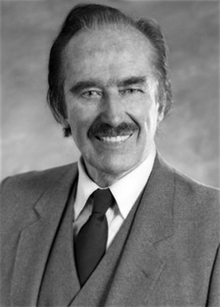 | |
| Born | Frederick Christ Trump October 11, 1905 New York City, New York, U.S. |
| Died | June 25, 1999 (aged 93) New Hyde Park, New York, U.S. |
| Resting place | Lutheran All Faiths Cemetery, New York City, U.S. |
| Education | Pratt Institute Richmond Hill High School |
| Occupation | Head of Elizabeth Trump & Son Co. |
| Known for | Being the father of Donald Trump |
| Net worth | US $250–300 million (June 1999) |
| Spouse(s) | Mary Anne MacLeod (m. 1936) |
| Children | 5, including:
|
| Parent(s) | Frederick Trump Elizabeth Christ Trump |
| Relatives | See Trump family |
In partnership with his mother Elizabeth Christ Trump, he began a career in home construction and sales. The real estate development company was incorporated as E. Trump & Son in 1927, and grew to build and manage single-family houses in Queens, barracks and garden apartments for U.S. Navy personnel near major shipyards along the East Coast, and more than 27,000 apartments in New York City.
Trump was investigated by a U.S. Senate committee for profiteering in 1954, and again by the State of New York in 1966. He made Donald the president of Trump Management Company in 1971, and they were sued by the U.S. Justice Department's Civil Rights Division for violating the Fair Housing Act in 1973. Throughout his career he contributed to local hospitals, various American nonprofit organizations, and international Jewish causes.
Early life and career
Frederick Christ Trump was born in the Bronx on October 11, 1905. He was the second of three children of German Lutheran immigrants Frederick and Elizabeth Christ Trump. He had an older sister, Elizabeth Trump Walters (1904–1961), and a younger brother, John G. Trump (1907–1985). Trump was conceived in Bavaria, where his parents had tried unsuccessfully to re-establish residency,[1] returning to New York upon the SS Pennsylvania on July 1, 1905.[2] Soon after Trump's birth, the family moved to Woodhaven, Queens. When Trump was 12 years old, his father died in the 1918 flu pandemic.[3] From 1918 to 1923, he attended Richmond Hill High School in Queens;[4] he worked as a caddy, curb whitewasher, and delivery boy.[5] Meanwhile, Trump's mother continued the real-estate business his father had begun. Interested in becoming a builder, Trump took night classes in carpentry and reading blueprints.[6] He also studied plumbing, masonry, and electrical wiring via correspondence courses.[7] He graduated from Richmond Hill High School in 1923.[8][9]
After graduating, Trump obtained full-time work pulling wagonloads of building materials to construction sites.[10] He found work as a carpenter and continued his education at Pratt Institute.[10] Trump began construction of his first house in 1923, soon after graduating high school.[11] Elizabeth Trump partially financed Trump's houses,[12] and held the business in her name because Fred had not reached the age of majority.[11] They did business as "E. Trump & Son".[13] The company was incorporated in 1927,[14][15] but the name was in use at least as early as 1926.[16] By 1926, Trump had built 20 homes in Queens.[17] By the mid-1930s (in the middle of the Great Depression), he built one of the first modern supermarkets in the city, selling customer-collected goods with the Trump Market in Woodhaven, which advertised "Serve Yourself and Save!" and quickly became popular. After six months, Trump sold it to the King Kullen supermarket chain, which he had originally modeled it after.[6][18]
1927 arrest
On Memorial Day in 1927, the Ku Klux Klan marched in Queens to protest Protestant American citizens being "assaulted by Roman Catholic police of New York City."[19] Trump and six other men were arrested "on a charge of refusing to disperse from a parade when ordered to do so."[20][21] All seven arrested were referred to as "berobed marchers" in the Long Island Daily Press; Trump was the only one not held on charges.[19][22]
When asked about the issue in September 2015 after Boing Boing dug up the article, his son Donald Trump, then a candidate for president of the United States, denied that his father had ever been arrested.[19][23]
Personal life
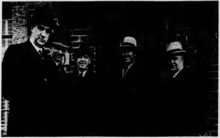
Trump met his future wife Mary Anne MacLeod, an immigrant from Tong, Lewis, Scotland, at a party in the 1930s. Trump told his mother the same evening that he had met his future wife.[24] Trump, a Lutheran, married Mary, a Presbyterian, on January 11, 1936[24] at the Madison Avenue Presbyterian Church with George Arthur Buttrick officiating.[25] A wedding reception was held at the Carlyle Hotel in Manhattan. Fred and Mary Trump settled in Jamaica, Queens,[26] and had five children:[27] Maryanne Trump Barry (born 1937),[lower-alpha 1] Fred Trump Jr. (1938–1981),[lower-alpha 2][28] Elizabeth Trump Grau (born 1942),[lower-alpha 3][30] Donald Trump (born 1946)[lower-alpha 4][31] and Robert Trump (born 1948).[lower-alpha 5][32]
Trump was an authoritarian parent, maintaining curfews and forbidding cursing, lipstick, and snacking between meals.[33] At the end of his day, Trump would receive a report from Mary on the children's actions, and if necessary, decide upon disciplinary actions.[33] He took his children to building sites to collect empty bottles to return for the deposits.[34] The boys had paper routes, and when weather conditions were poor, their father would let them make their deliveries in a limousine.[34]
During World War II and until the 1980s, Trump denied that he spoke German and claimed that he was of Swedish origin.[35] According to Trump's nephew, John Walter, "He had a lot of Jewish tenants and it wasn't a good thing to be German in those days."[3] Donald Trump's The Art of the Deal (1987) falsely states that Fred Trump was the son of an immigrant from Sweden and born in New Jersey.[36][lower-alpha 6]
In 1981, Trump's oldest son, Frederick Jr., died at age 42 from complications due to alcoholism.[38]
Career
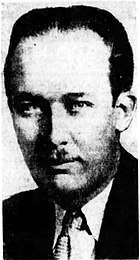
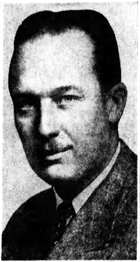
During World War II, Trump built barracks and garden apartments for U.S. Navy personnel near major shipyards along the East Coast.[lower-alpha 7][3] After the war, he expanded into middle-income housing for the families of returning veterans, building Shore Haven in Bensonhurst in 1949, and Beach Haven near Coney Island in 1950 (a total of 2,700 apartments). The same year, he authored an article advertising his apartments in the real-estate section of the Brooklyn Eagle,[39] which frequently featured him and his company.[40] In 1963–1964, he built Trump Village, an apartment complex in Coney Island, for $70 million.[6] He built more than 27,000 low-income apartments and row houses in the New York area.[lower-alpha 8][3][41]
Profiteering investigations
In early 1954, President Dwight D. Eisenhower and other federal leaders began denouncing real-estate profiteers. On June 11, The New York Times included Trump on a list of 35 city builders accused of profiteering from government contracts.[42] He and others were investigated by a U.S. Senate Banking committee for windfall gains. Trump and his partner William Tomasello (who previously had mafia ties)[43] were cited as examples of how profits were made by builders using the Federal Housing Administration (FHA).[44]:409 The two paid $34,200 for a piece of land which they rented to their corporation for $76,960 annually in a 99-year lease, so that if the apartment they built on it ever defaulted, the FHA would owe them $1.924 million. Trump and Tomasello evidently obtained loans for $3.5 million more than the Beach Haven apartments had cost.[45][44]:58 Trump argued that because he had not withdrawn the money, he had not literally pocketed the profits.[42][44]:410 He further argued that due to rising costs, he would have had to invest more than the 10% of the mortgage loan not provided by the FHA, and therefore suffer a loss if he built under those conditions.[44]:414–5
In 1966, Trump was again investigated for windfall profiteering, this time by New York's State Investigation Commission. After Trump overestimated building costs sponsored by a state program, he profited $598,000 on equipment rentals in the construction of Trump Village, which was then spent on other projects. Under testimony on January 27, 1966, Trump said that he had personally done nothing wrong and praised the success of his building project.[46] The commission called Trump "a pretty shrewd character" with a "talent for getting every ounce of profit out of his housing project," but no indictments were made. Instead, tighter administration protocols and accountabily in the state's housing program were called for.[47]
Son becomes company president
Fred's son Donald Trump joined Trump Management Company around 1968, and rose to become company president in 1971.[48] In the mid-1970s, Donald received loans from his father exceeding $14 million (later claimed by Donald to have been only $1 million).[49] This allowed Donald to enter the real-estate business in Manhattan, while his father stuck to Brooklyn and Queens.[50] "It was good for me," Donald later commented. "You know, being the son of somebody, it could have been competition to me. This way, I got Manhattan all to myself."[3]
Donald Trump renovated the Grand Hyatt New York in the late 1970s, for which Fred provided $2 million to help repay the construction loan. He further assisted his son with a $35 million line of credit, a $30 million mortage, and an additional corporate loan.[51]
Fred Trump's son Robert also worked for the company, becoming a top executive before his retirement.[28][52]
Civil rights suit and code violations
Minority applicants turned away from renting apartments complained to the New York City Commission on Human Rights and the Urban League, leading the League and other groups to send test applicants to Trump-owned complexes in July 1972. They concluded that whites were offered apartments, while blacks were generally steered away. Both of the aforementioned advocacy organizations then raised the issue with the Justice Department.[53] In October 1973, the Civil Rights Division of the U.S. Department of Justice (DOJ) filed a civil rights suit against the Trump Organization (Fred Trump, chair, and Donald Trump, president) for infringing the Fair Housing Act of 1968.[53] In response, Trump attorney Roy Cohn countersued for $100 million by implicating the DOJ for allegedly false accusations.[53]
Court records showed that four landlords or rental agents confirmed that applications sent to the Trump organization's head office for approval denoted the race of the applicant.[54] A rental agent said that Fred Trump had instructed him "not to rent to blacks" and to "decrease the number of black tenants by encouraging them to locate housing elsewhere."[54] A consent decree between the DOJ and the Trump Organization was signed on June 10, 1975, with both sides claiming victory—the Trump Organization for its perceived ability to continue denying rentals to welfare recipients, and the head of DOJ's housing division for the decree being "one of the most far-reaching ever negotiated."[53][54] It personally and corporately prohibited the Trumps from "discriminating against any person in the ... sale or rental of a dwelling," and "required Trump to advertise vacancies in minority papers, promote minorities to professional jobs, and list vacancies on a preferential basis".[54] Finally, it ordered the Trumps to "thoroughly acquaint themselves personally on a detailed basis with ... the Fair Housing Act of 1968."[53][55]
In early 1976, Trump was ordered by a county judge to correct code violations in a 504-unit property in Seat Pleasant, Maryland. According to the county's housing department investigator, violations included broken windows, dilapidated gutters, and missing fire extinguishers.[lower-alpha 9] After a court date and a series of phone calls with Trump, he was invited to the property to meet with county officials in September 1976 and arrested on site.[57] Trump was released on $1,000 bail.[56]
Wealth and estate
Trump appeared on the initial Forbes 400 list of richest Americans in 1982 with an estimated $200 million fortune shared with his son Donald.[58] In 1976, Trump had set up trust funds of $1 million ($4.5 million in 2019 dollars) for each of his five children and three grandchildren, which paid out yearly dividends.[59] By 1993, the siblings' anticipated shares of Trump's estate amounted to $35 million each.[60][59] Upon Trump's death in 1999, his will divided $20 million after taxes among his surviving children.[59][61][62]
In October 2018, The New York Times published an exposé drawing on more than 100,000 pages of tax returns and financial records from Trump's businesses, and interviews with former advisers and employees. The Times concluded that his son Donald "was a millionaire by age 8,"[63] and that he had received $413 million (adjusted for inflation) from Fred's business empire over his lifetime.[64] According to the Times, the elder Trump loaned at least $60 million to his son, who largely failed to reimburse him.[63] The paper also described a number of purportedly fraudulent tax schemes, for example when Trump sold shares in Trump Palace condos to his son well below their purchase price, thus masking what could be considered a hidden donation, and benefiting from a tax write-off.[64] Donald Trump's lawyer denied the allegations of fraud and tax evasion.[65]
Philanthropy
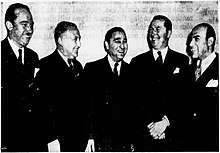
Fred and Mary Trump supported medical charities by donating buildings. After Mary received medical care at the Jamaica Hospital Medical Center, they donated the Trump Pavilion;[3][66] Fred was also a trustee of the hospital.[67] The couple donated a two-building complex in Brooklyn as a home for "functionally retarded adults" and other buildings to the National Kidney Foundation of New York and New Jersey.[3][66] The Cerebral Palsy Foundation of New York and New Jersey also received a building.[3] In addition, Fred made charitable contributions to the Long Island Jewish Hospital and the Hospital for Special Surgery in Manhattan.[3]
The Trumps were active in The Salvation Army, the Boy Scouts of America, and the Lighthouse for the Blind.[66] Fred also supported the Kew-Forest School,[3] where his children attended and he served on the board of directors.[68] Trump was so active in Jewish and Israeli causes that some believed that he belonged to the Jewish faith.[35] This including donating the land for the Beach Haven Jewish Center in Flatbush, New York,[69] supporting Israel Bonds,[70] and serving as the treasurer of an Israel benefit concert featuring American easy-listening performers.[67]
Later years and death
During the 1980s, Fred Trump became friends with future Prime Minister of Israel Benjamin Netanyahu, who at the time was the Israeli Ambassador to the United Nations in Manhattan.[71]
Fred and his wife were given an apartment on the 63rd (in reality the 55th)[72] floor of their son's Trump Tower, which they rarely used.[73] The couple remained together until Fred's death.[74] He suffered from Alzheimer's disease for the last six years of his life,[3] and finally fell ill with pneumonia in June 1999. He was admitted to Long Island Jewish Medical Center in New Hyde Park, where he died at age 93 on June 25.[75] Trump's estate was estimated by his family at $250 million to $300 million.[3] His funeral was held at the Marble Collegiate Church[75] and his body is interred at Lutheran All Faiths Cemetery in Middle Village, Queens.[76] His widow, Mary, died the following summer, on August 7, 2000, in New Hyde Park, New York, at age 88.[66]
In popular culture
Folk icon Woody Guthrie was a tenant in one of Trump's apartment complexes in Brooklyn in 1950.[45] In his unrecorded song "Old Man Trump", he accused his landlord of stirring up racial hate "in the bloodpot of human hearts".[77]
An episode of the 2019 television series Watchmen appears to depict Fred Trump as a member of the Ku Klux Klan.[78] Comedian Seth MacFarlane credits Donald Trump's fortune to his father, comparing their relationship to that of Jaden and Will Smith.[79] A satirical piece in McSweeney's depicts someone who attempts to go back in time to kill Adolf Hitler, but instead arrives at the hospital room where Fred and Mary Trump are with their newborn baby Donald.[80]
References
Footnotes
- A federal appeals court judge
- An airline pilot with Trans World Airlines
- An executive at Chase Manhattan Bank[29]
- Businessman, television personality and 45th president of the United States
- A top executive of his father's property management company
- As president of the United States, Donald Trump has on at least three occasions incorrectly stated that his father was born in Germany.[37]
- Including Chester, Pennsylvania, Newport News and Norfolk, Virginia
- Including Coney Island, Bensonhurst, Sheepshead Bay, Flatbush, and Brighton Beach in Brooklyn, and Flushing and Jamaica Estates in Queens
- According to the vice president of the subsidiary company responsible for the property, it had recently seen an increase in low-income tenants.[56]
Citations
- Connolly, Kate (November 21, 2016). "Historian finds German decree banishing Trump's grandfather". The Guardian.
- Blair 2005, p. 110.
- Rozhon, Tracie (June 26, 1999). "Fred C. Trump, Postwar Master Builder of Housing for Middle Class, Dies at 93". The New York Times. Retrieved January 29, 2017.
- Blair 2005, p. 117.
- Blair 2005, p. 119.
- Snyder, Gerald S. (July 26, 1964). "Millionaire Calls Work His Hobby". The Bridgeport Post: 65. Retrieved January 29, 2017 – via Newspapers.com.
- Blair 2015, p. 119.
- "Looking back at Donald Trump's father's connection to Woodhaven". QNS.com.
- Blair, Gwenda (October 6, 2015). The Trumps: Three Generations of Builders and a Presidential Candidate. Simon and Schuster. p. 486. ISBN 9781501139369 – via Google Books.
- Blair 2015, p. 120.
- Whitman, Alden (January 28, 1973). "A builder looks back—and moves forward". New York Times. Retrieved October 8, 2018.
- Mason, Joseph B. (December 1, 1940). "Biggest one-man building show". American Builder and Building Age. ProQuest 853825839.
When [Fred Trump] was 27 years old he started his first small home building job on his own, but with some financial backing from his mother.
– via ProQuest (subscription required) - Barrett, Wayne (2016). Trump: The Greatest Show on Earth: The Deals, the Downfall, the Reinvention. Simon & Schuster. p. 63. ISBN 9781942872979.
- "New concerns function with Queens capital". The Daily Star. April 16, 1927. p. 16.
E. Trump & Son Company, Inc., of Jamaica, has been formed with $50,000 capital to deal in realty.
- "New Concerns Function with Queens Capital". The Daily Star. April 16, 1927.
- "Homeseekers buy Hollis dwellings". New York Times. July 21, 1926. p. 32.
They also sold for E. Trump & Son a Colonial type dwelling on Wall Street to William Socolow for occupancy.
- Blair 2005, pp. 120–22.
- Blair 2015, p. 123.
- Bump, Philip (February 29, 2016). "In 1927, Donald Trump's Father Was Arrested After a Klan Riot in Queens". The Fix. The Washington Post. Retrieved January 29, 2017.
- Pearl, Mike (March 10, 2016). "All the Evidence We Could Find About Fred Trump's Alleged Involvement with the KKK". Vice. The Vice Guide to the 2016 Election. Retrieved January 29, 2017.
- Blum, Matt (September 9, 2015). "1927 news report: Donald Trump's dad arrested in KKK brawl with cops". Boing Boing. Retrieved January 28, 2018.
- "Warren Criticizes 'Class Parades'". The New York Times. The New York Times Company. June 1, 1927. Retrieved May 15, 2019.
Fred Trump of 175-24 Devonshire Road, Jamaica, was discharged.
- Horowitz, Jason (September 22, 2015). "First Draft: In Interview, Donald Trump Denies Report of Father's Arrest in 1927". The New York Times. Retrieved January 29, 2017.
It's unfair to mention it, to be honest, because there were no charges. They said there were charges against other people, but there were absolutely no charges, totally false.
- Blair 2015, pp. 147–148.
- Hannan, Martin (May 20, 2016). "An inconvenient truth? Donald Trump's Scottish mother was a low-earning migrant". The National. Retrieved November 19, 2016.
- Pilon, Mary (June 24, 2016). "Donald Trump's Immigrant Mother". The New Yorker. Retrieved February 12, 2017.
- Powell, Kimberly (March 2, 2016). "Donald Trump's German and Scottish Family Tree". About.com. Retrieved January 29, 2017.
- Horowitz, Jason (January 2, 2016). "For Donald Trump, Lessons From a Brother's Suffering". The New York Times. Retrieved January 29, 2017.
- Gavin, Michael (June 23, 2017). "Trump sister sells oceanfront Westhampton Beach home for $3.8M". Newsday. Retrieved May 28, 2018.
- "Meet the Trumps: The family tree of Donald Trump". MSN News. May 8, 2018. Retrieved May 28, 2018.
- Flegenheimer, Matt; Barbaro, Michael (November 9, 2016). "Donald Trump Is Elected President in Stunning Repudiation of the Establishment". The New York Times. Retrieved January 30, 2017.
- Chabba, Seerat (November 15, 2016). "Who Are Donald Trump's Siblings? What You Need To Know About Maryanne, Freddy, Elizabeth And Robert Trump". International Business Times. Retrieved January 29, 2017.
- Blair 2015, p. 228.
- Blair 2015, p. 229.
- Blair 2015, p. 159.
- "Fact Check: Trump's dad was not born in Germany". CNN. April 3, 2019. Retrieved April 3, 2019.
- Blake, Aaron (April 2, 2019). "Analysis | Trump wrongly claims his dad was born in Germany — for the third time". The Washington Post. Retrieved April 4, 2019.
- Collman, Ashley (April 11, 2019). "Meet Donald Trump's siblings, the oldest of whom just retired as a federal judge". Business Insider. Retrieved August 8, 2019.
- Trump, Fred C. (February 5, 1950). "Plan Brighton Houses For Gracious Living". Brooklyn Eagle (35): 33. Retrieved May 9, 2019.
- "Newspapers.com search". Brooklyn Public Library. Retrieved May 9, 2019.
- Blair 2015, pp. 121, 156.
- Blair 2015, pp. 175–176.
- "La Cosa Nostra". GlobalSecurity.org. Retrieved April 24, 2019.
- "Hearings Before the Committee on Banking and Currency" (PDF). The Washington Post. United States Senate: Eighty-Third Congress. July 20, 1954. Retrieved August 19, 2018.
- Moyer, Justin William (January 22, 2016). "The Unbelievable Story of Why Woody Guthrie Hated Donald Trump's Dad". The Washington Post. Retrieved January 29, 2017.
- Blair 2015, pp. 213–216. "Trump Village has the finest reputation. We finished eight months ahead of schedule, millions of dollars under anticipated constructions [sic] costs, and I don't think there will ever be another job in the city that will be able to shine a candle up against Trump Village."
- Blair 2015, pp. 215–216.
- Blair 2005, p. 23.
- Berzon, Alexandra; Rubin, Richard (September 23, 2016). "Trump's Father Helped GOP Candidate With Numerous Loans". The Wall Street Journal. Retrieved January 29, 2017.
- Glum, Julia (September 26, 2016). "How Much Money Did Trump Get From His Dad? The Small Loan Controversy Explained". International Business Times. Retrieved January 29, 2017 – via IBTimes.com.
- Blair 2015, pp. 295, 305.
- Kassel, Matthew (November 2, 2016). "Why Donald Trump's Brother Robert Has Been Lying Low During This Election". Town & Country. Retrieved July 17, 2019.
- Kranish, Michael; O’Harrow, Robert Jr. (January 23, 2016). "Inside the Government's Racial Bias Case Against Donald Trump's Company, and How He Fought It". The Washington Post. Retrieved January 29, 2017.
- Barrett, Wayne (January 15, 1979). "Like Father, Like Son: Anatomy of a Young Power Broker". The Village Voice. Retrieved January 29, 2017.
- United States of America vs. Fred C. Trump and Trump Management, Inc. (East District of New York Court October 15, 1973). Text
- DeYoung, Karen (September 30, 1976). "N.Y. Owner of P.G. Units Seized in Code Violations" (PDF). The Washington Post.
- Thompson, Vernon C. (March 10, 1977). "New Carrolton mayor seeks housing inspector". The Washington Post.
- Wang, Jennifer (March 24, 2016). "The Ups And Downs Of Donald Trump: Three Decades On And Off The Forbes 400". Forbes. Retrieved June 9, 2018.
- Kessler, Glenn (March 3, 2016). "Trump's false claim he built his empire with a 'small loan' from his father". The Washington Post.
- O'Brien, Timothy L. (October 23, 2005). "What's He Really Worth?". The New York Times. Retrieved February 25, 2016.
- Rozhon, Tracy (June 26, 1999). "Fred C. Trump, Postwar Master Builder of Housing for Middle Class, Dies at 93". The New York Times. Retrieved August 19, 2015.
- Horowitz, Jason (January 2, 2016). "For Donald Trump, Lessons From a Brother's Suffering". The New York Times.
Then came the unveiling of Fred Sr.'s will, which Donald had helped draft. It divided the bulk of the inheritance, at least $20 million, among his children and their descendants, 'other than my son Fred C. Trump Jr.'
- Barstow, David; Craig, Susanne; Buettner, Russ (October 2, 2018). "11 Takeaways From The Times's Investigation Into Trump's Wealth". The New York Times. Retrieved October 3, 2018.
- Barstow, David; Craig, Susanne; Buettner, Russ (October 2, 2018). "Trump Engaged in Suspect Tax Schemes as He Reaped Riches From His Father". The New York Times. Retrieved October 2, 2018.
- Campbell, Jon; Spector, Joseph (October 3, 2018). "New York could levy hefty penalties if Trump tax fraud is proven". USA Today. Retrieved October 5, 2018.
- NYT Staff (August 9, 2000). "Mary MacLeod Trump Philanthropist, 88". The New York Times. Retrieved January 30, 2017.
- Blair 2015, p. 174.
- Tuccille, Jerome (1985). Trump: The Saga of America's Most Powerful Real Estate Baron. Beard Books. p. 38. ISBN 9781587982231. Retrieved February 18, 2017.
- TJP Staff (November 21, 2016). "Trump Family Donated Bigly to Jewish, Israeli Causes". The Jewish Press. Brooklyn, NY. JNi.Media. Retrieved January 30, 2017.
- Haaretz Staff (March 25, 2016). "The Swedish Whopper: Donald Trump's Long-standing Struggle With the Truth" (print and online). Haaretz. Retrieved January 30, 2017 – via Haaretz.com.
- Sherman, Gabriel (June 1, 2016). "Trump Is Considering a Pre-Convention Visit to Israel". New York. Retrieved January 29, 2017.
- Abelson, Max; Drucker, Jesse; Mider, Zachary R. (October 25, 2016). "Inside Trump Tower, the Center of the Billionaire's Universe". Bloomberg.com. Retrieved May 1, 2019.
- Blair 2015, p. 327.
- Blair 2015, p. 453.
- Mosconi, Angela (June 26, 1999). "Fred Trump, Dad of Donald, Dies at 93". New York Post. Retrieved January 29, 2017.
- Scovell, Nell (October 11, 2016). "A Visit to Trump's Graveyard". Esquire. Retrieved January 20, 2017.
- Kaplan, Thomas (January 25, 2016). "Woody Guthrie Wrote of His Contempt for His Landlord, Donald Trump's Father". The New York Times. Retrieved January 29, 2017.
- Smail, Gretchen (November 25, 2019). "There Was A Sneaky Dig At Trump's Family In 'Watchmen' This Week". Bustle. Retrieved November 25, 2019.
- Love, Matthew (November 8, 2016). "200+ Great Donald Trump Jokes and Sketches". Vulture. Retrieved July 22, 2019.
- Wayne, Teddy (September 26, 2018). "A Time Traveler Goes Back in Time to the Birth of Baby Hitler But Gets the Wrong Baby". McSweeney's Internet Tendency. Retrieved July 22, 2019.
Sources
- Blair, Gwenda (2015) [2000]. The Trumps: Three Generations of Builders and a Presidential Candidate. New York City: Simon & Schuster. ISBN 978-1501139369.CS1 maint: ref=harv (link)
- —— (2005) [2000]. The Trumps: Three Generations of Builders and a Presidential Candidate. New York City: Simon & Schuster.CS1 maint: ref=harv (link)
Further reading
- Brenner, Marie (September 1990). "After the Gold Rush". Vanity Fair.
- Petski, Denise (April 2, 2019). "Donald Trump Says His Father Was Born In Germany (He Wasn't)". Deadline.
External links
- Fred Trump at Find a Grave
- Fredrick Trump Jr. at geni.com (registration required)